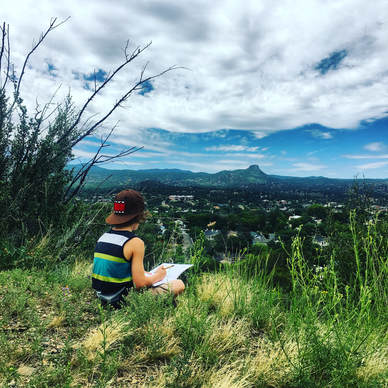Active Pedagogy

Traditional education typically relies on teachers presenting information to students who passively receive it, then repeat what they learned or memorized through standardized testing. Grades are then assigned based on test performance, serving as extrinsic rewards or punishments.
In contrast, we believe that when students are actively engaged in their learning through a compelling, interactive, and dynamic curriculum, they develop intrinsic motivation and a love of learning. Through a combination of whole group instruction, center-based activities, thematic projects, small group collaborations, and individual work, students are motivated to learn, forming connections to their academic investigations. This results in the students' achievement because they want to learn - not to gain an extrinsic grade reward. This intrinsic motivation and self-direction fosters a lifetime love of learning and the child's ability to learn how to learn, as opposed to simply learning what is needed in order to pass a test.
This approach to academic learning trains students to assume a greater responsibility for their education and their lives. Not only do they develop study habits that will serve them well for years to come, but they also develop important life skills as family and community members and as informed and active citizens of the world.
In contrast, we believe that when students are actively engaged in their learning through a compelling, interactive, and dynamic curriculum, they develop intrinsic motivation and a love of learning. Through a combination of whole group instruction, center-based activities, thematic projects, small group collaborations, and individual work, students are motivated to learn, forming connections to their academic investigations. This results in the students' achievement because they want to learn - not to gain an extrinsic grade reward. This intrinsic motivation and self-direction fosters a lifetime love of learning and the child's ability to learn how to learn, as opposed to simply learning what is needed in order to pass a test.
This approach to academic learning trains students to assume a greater responsibility for their education and their lives. Not only do they develop study habits that will serve them well for years to come, but they also develop important life skills as family and community members and as informed and active citizens of the world.
Thematic Projects

The Skyview curriculum is framed by thematic projects, the basis of which is formed by compelling topics derived from content standards. Thematic projects feature linked investigations and intersecting content areas and are created for real audiences and real-world applications.
The multiple intelligences (MI) inform these projects, providing rich final products. Thematic projects require students to acquire deep understanding and skills that fulfill academic standards as well as goals related to the emotional intelligences ("Who am I / Who are we?")
The multiple intelligences (MI) inform these projects, providing rich final products. Thematic projects require students to acquire deep understanding and skills that fulfill academic standards as well as goals related to the emotional intelligences ("Who am I / Who are we?")
Skyview's Annual Theme and Project-Based Learning Curricula
Another level to our thematic projects is our bi-annual school-wide theme, either Discovering the Human Spirit or Connections. During the year of Discovering the Human Spirit, students participate in a variety of activities designed to discover, develop, and honor inspiration, wonder, contribution to the betterment of the world, and the love of self, others, and of the nature that surrounds us.
During the year of Connections, students participate in a variety of activities designed to develop understanding, awareness, and appreciation of relationships among people, events, and the natural world.
During the year of Connections, students participate in a variety of activities designed to develop understanding, awareness, and appreciation of relationships among people, events, and the natural world.
Kindergarten Thematic Project-Based Curriculum
Kindergarten does not combine two years of curriculum as they are just one grade level. Therefore, their project-based curriculum combines the two themes of
Discovering the Human Spirit and Connections each year.
Click HERE for our Kindergarten's Project-Based Curriculum!
Discovering the Human Spirit and Connections each year.
Click HERE for our Kindergarten's Project-Based Curriculum!
Primary (Grade1) Thematic Project-Based Curriculum
Intermediate 2-3 Thematic Project-Based Curriculum
Intermediate 4-5 Thematic Project-Based Curriculum
Middle School (6-8th) Thematic Project-Based Curriculum
